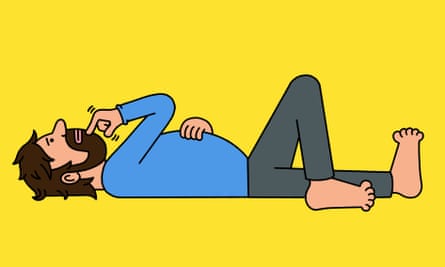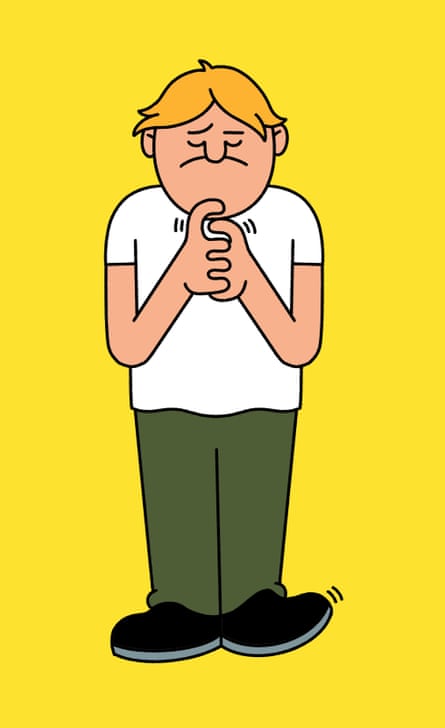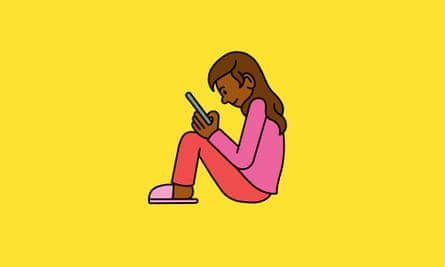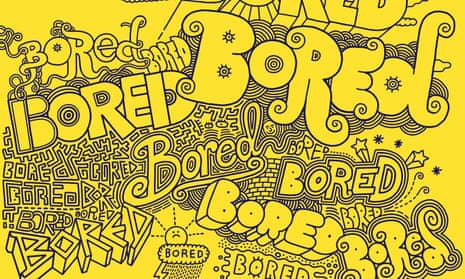I remember my first experience of boredom as vividly as my first kiss. The recollection is so clear I thought I must have been at least seven years old. Actually, my mother tells me, I was only three or four, which makes being bored my earliest memory. My sister and I were sitting in our family car, parked outside Mum’s friend’s house, into which she had disappeared. “Won’t be long,” she’d said. That had been 15 minutes earlier. I could do nothing but wait, but I wanted, strongly, to do anything else. I felt the bind on a physical level, the confines of the car consistent with the constraints on me. This was boredom, and I was appalled by it.
Neither the car radio nor my baby sister offered any relief. Then my gaze landed on a small hole in the velour lining of the car roof. One of the defining characteristics of boredom is that time seems to drag – minutes pass as hours. The inverse is also true: when we are highly engaged in what we are doing, we lose track. So I cannot tell you how long I had been happily at work on that hole when mum finally returned to the car to find the back seat, and both of her children, coated with foam.
I was in trouble, of course – but I was not convinced that I’d done anything wrong. Instead it was as though, in putting an end to that desperate boredom, I had narrowly escaped falling off some kind of precipice – and I knew I would do whatever it took to avoid going over the edge in future.
I did not understand then – two decades before my first conference call or doctor’s waiting room – that boredom was a fact of life no more avoidable than any other mental state, good or bad. At times, it may even be a dominant experience. Studies show boredom levels rise through childhood, peak in early adulthood, and then decline, hitting the floor in one’s 50s. But though boredom may be less prominent in middle life, it is still present – evidence suggests it comes creeping back in your 60s, especially among women.

It is a familiar feeling and very common. Indeed, the coronavirus pandemic has been described as a “boom time for boredom”. Most of us are poorly equipped to cope with being shut in our homes indefinitely, even with the internet to distract us.
But we should not fear being bored, say psychologists James Danckert and John D Eastwood, the authors of Out of My Skull: The Psychology of Boredom. Their research has revealed boredom to be widely misunderstood, perhaps even unfairly maligned. Boredom evolved to help us, says Danckert. It signals that we are unengaged, in need of an activity to satisfy us. “I think that’s a good thing, in a lot of ways. How we respond to it is up to us. I think you can minimise it. But do you want to totally eliminate it? I don’t think you do.”
Danckert and Eastwood contend that boredom can steer us towards realising our potential and living full, meaningful lives. They say it communicates an important message that – in trying to outrun it my entire life – I had been refusing to heed.
What if I stopped and listened?
Danckert is an Australian cognitive neuroscientist now based at the University of Waterloo in Ontario. He began studying boredom 15 years ago, a case of “physician, heal thyself,” he says. “As a kid, and still into my adult years, I experience boredom, and whenever I do, I hate it. I find it a very frustrating, agitating experience.”
This isn’t a new phenomenon. To quote from Boredom: A Lively History, by the classicist Peter Toohey, the Roman Stoic philosopher Seneca wrote in disgust: “How long the same things? Surely I will yawn, I will sleep, I will eat, I will be thirsty, I will be cold, I will be hot. Is there no end?” In the Middle Ages monks complained of “the noonday demon”: the personification of acedia – torpor, alongside agitation – provoked by the constraints and repetition of their daily lives. And though one could already be “a bore”, it was Dickens who was the first to term it “boredom” – in Bleak House in 1852. Lady Dedlock complains of being “bored to death” of herself, more than a century before Bruce Springsteen would express the same restless dissatisfaction in Dancing in the Dark. His characterisation of boredom as a frustrated hunger (“I’m just about starving tonight”) evokes Tolstoy’s definition in Anna Karenina of the feeling as “the desire for desires”.

“Boredom is such a fascinating topic, with tentacles that spread into philosophy, anthropology, literature, religion, theology,” says Eastwood, who is head of the Boredom Lab at York University in Toronto. There researchers study boredom from social, clinical and cognitive perspectives – from shoring up the link with creativity and improving outcomes in education, to better understanding the subjective experience of mental exertion and attention – with a view to applying their findings in the real world. “But as a scientist, I wasn’t convinced that everybody was using the term in the same way.”
Eastwood became interested in boredom 20 years ago, after observing a seeming “crisis of agency” among young men he saw in his private psychotherapy practice. They were disengaged, under-achieving, perhaps abusing marijuana or struggling with depression, he says. Eastwood characterises their circumstance as a “failure to launch into life”, which these men told him they experienced as “being chronically bored”. But what was being bored, exactly? “I thought: what is this?”
In Out of My Skull, he and Danckert define boredom as the uncomfortable feeling of “wanting to do something, but not wanting to do anything”. It is not an emotion, as such, but an ongoing cognitive process where we wish to engage our minds, but nothing seems to satisfy. It is neither daydreaming, which we might find highly absorbing, nor, necessarily, vegging out on the sofa.
It is this particular combination of lethargy and restlessness that distinguishes boredom from frustration (where a specific desire has been thwarted) and apathy (where there is no desire at all). And though boredom seems to be a risk factor for depression, it is not the same. To be bored is often thought of as a character flaw, reflecting laziness or lack of curiosity. “Only boring people get bored,” goes the aphorism. “I’m highly motivated to prove it’s not true,” jokes Danckert.
It is when we fail to act on the signal, or succumb to distractions, that the feeling of boredom becomes protracted and causes us misery. As the Booker prize winner Anne Enright wrote recently: “Boredom is a productive state, so long as you don’t let it go sour on you.” It is striking that the predisposition to it is negatively perceived in a way that other personality traits aren’t. Complaints of “I’m bored” are often seen as uniquely provoking, Eastwood notes. “There is this impulse in us to say, ‘There’s something wrong with you, you should not be bored.’ But to simply judge them, I think, misses the point. They know there’s things to do – but they can’t bring their desires in the moment in line with what’s there.”

Some people are better equipped to cope than others. In Out of My Skull, the psychologists compare two astronauts who responded very differently to the constraints and monotony of space exploration. Russia’s Valentin Lebedev, who spent 211 days in space in the early 1980s, failed to be satisfied by the busy work dictated by ground control and, after five months, did not “even want to look out of a porthole”. As commander of the International Space Station in 2013, Canadian Chris Hadfield found purpose even in plumbing repairs. The psychologists suggest it was Hadfield’s intrinsic motivation to find meaning in what he was doing, and to occupy and challenge himself within the confines of his environment, that set the two astronauts apart. Hadfield claims to never be bored – but, Danckert says, it’s more that “he just deals with it really very well”.
In the years after I tore apart Mum’s car, I got better at not being bored, even in testing conditions. My parents are enthusiastic sailors and most of my school holidays were spent in the close confines of their yacht, without television or internet, during sometimes long passages at sea.
On those trips I read every book on board, regardless of interest (a dictionary; a medical encyclopaedia) or age appropriateness (pulpy Dick Francis thrillers, replete with rumpy-pumpy); and when I ran out of other people’s stories, I wrote my own. I spent long periods listening to the same music. At a push, I could be alone with my thoughts, observing them with slight indifference, as though they were a TV show that had not yet hooked me.
I considered this evidence of my extreme aversion to boredom. In fact, according to Danckert and Eastwood, I may just have developed a good response to it. Though it has not been substantiated by research, they suggest that boredom has been the push for much creativity, innovation and growth – while simultaneously a source of distress for many.
The mistake many people make is seeking to escape the uncomfortable feeling, instead of interrogating what it is trying to tell them, says Eastwood. They may distract themselves with social media, or worse: boredom has also been shown to be a factor in unhealthy eating, as well as use of cigarettes, alcohol and drugs.

In relying on external solutions, we undermine our sense of ourselves as the authors of our own lives, and the problem may become chronic. In young people, boredom is associated with higher than average risk-taking; in the elderly, it can speed up the degenerative process of ageing. Both groups are at particular risk of depression, for which boredom is a precursor.
Boredom-prone people also experience higher levels of anger, aggression and hostility and may be driven to look for meaning in extreme political views, or tribalism. To Danckert, that means boredom may be one part of our ever more polarised politics and public discourse. “When you’re in the midst of an overload of information, one response is to shout louder,” he says. Sociologist Orrin Klapp, writing in 1986, called it “ego-screaming” and that “perfectly captures Twitter trolling,” says Danckert.
The fact that our response to boredom is often destructive, adversarial or otherwise problematic speaks to just how deeply uncomfortable we find the sensation. A 2014 study found that many people chose to administer painful electric shocks to themselves rather than being left alone with their thoughts. One man shocked himself 190 times in 15 minutes.
“All too often when we’re bored, we see ourselves as passive, empty vessels to fill – we look for stimuli that will get rid of the bad feeling in the short term,” says Eastwood. “But it doesn’t foster and grow our capacity for agency – and that’s exactly what we need to be free from boredom and its negative consequences.”
Danckert and Eastwood are reluctant to blame the present problem on our preoccupation with technology alone. But it is true that tech presents us with a powerful distraction. If the goal is to simply avoid being bored, it may be easier now than ever, what with the infinite scroll of social media, endless hours of entertainment on Netflix and Spotify, and all our friends always available.
But this over-abundance of things to do itself can exacerbate boredom. Eastwood evokes the “paradox of choice”, saying “options are not necessarily freeing and do not necessarily make us happy”. Seeking relief on the internet “can feel like trying to drink from a fire hose” Danckert and Eastwood write. Not only that, in hijacking our attention, technology may, over time, compound the issue it seems to alleviate. “It takes time and attention to scroll through Instagram or play Candy Crush, but at the end of it, you’re not satisfied, because you didn’t do the harder work of figuring out: ‘What do I really want to do?’ It’s a vicious cycle: you got some engagement, but it wasn’t the thing you needed,” says Danckert. That is the challenge that boredom lays down, he says: “to figure out what is going to be meaningful and useful to you in your life”.
Becoming better attuned to our own inner states can allay the discomfort and illuminate a satisfying course of action. Mindfulness, which fosters a non-judgmental response to one’s thoughts (as I now know I practised on my parents’ boat), has been linked to lower levels of boredom. Danckert lets his mind wander on his three-mile walk to work , thinking of “the dumbest things – but it is engaging to just follow those threads and see where they lead you”.
Eastwood’s own ritual is making time to sit and think, with a cup of tea – a period of “constructive internal reflection”, during which he connects with his internal compass. Uncomfortable feelings steer us for the better, he says. “Just as it’s good that we have the capacity for pain, to keep us safe, it’s good that we have the capacity for boredom, because it saves us from the ruin of stagnation. It keeps us moving forward and searching for a better way of applying ourselves, for engaging in the world.”
Received in that spirit, boredom can be a call to action – but many of us choose not to hear it. Wincing, I admit to Danckert that I have opened Twitter, scrolled for a while, become bored with scrolling, closed Twitter, then immediately opened Twitter again, almost instinctively. I do this embarrassingly often, I tell him – it’s just easier to push through boredom on the internet, rather than taking it as a cue to log off.
Danckert reiterates, not without sympathy, I think, that at moments like that it is better to “just do something”. It does not necessarily have to align with some higher purpose in life – simply putting down my phone will break the cycle of unsatisfying engagement, and reinforce my own sense of my autonomy.
Within weeks of our interview, a global pandemic takes hold, and I count myself lucky to just be bored. Confined to my home, I spend more time alone with my thoughts, wondering about what I might want to do once all this is over. I spend less time on my phone. I read my flatmate’s books that have rested on our communal shelf for years without ever piquing my curiosity. I bake, for the first time since childhood. Constraints that might have been boring are in fact oddly motivational.
As Danckert and Eastwood write in Out of My Skull, when we are “constantly carried along by a fast-moving stream, we can forget how to swim for ourselves”. It is this that boredom seeks to remind us of, they suggest – that we are the authors of our lives, even now they’ve been derailed.

How to avoid boredom
1. Don’t fight the feeling. Boredom is uncomfortable, but you make it worse by layering suffering on top. Think of when you twist your ankle – you feel pain without berating yourself for being clumsy, or fretting about a chronic injury. Feeling bored is unavoidable, but it is not a judgment on your character or ability.
2. Create a new routine. Boredom flourishes within constraints. In the absence of ordinary routines and busyness, it may feel like you are stagnating. Try to find another gear – one that may not be as high-energy, or productive, but is full at the same time.
3. Find purpose. Boredom is not an absence of things to do, it is the struggle to find value in any of the options available to you. Being able to connect with a reason “why” for doing something (including quarantine) can make it less boring. Instead of agitating for anything to do, try to determine what’s really important – whether right now, or for the future.
4. Avoid passive consumption. It is all too easy to binge Netflix or scroll social media. If you’re enjoying yourself, there’s no problem, but treating yourself as a passive consumer may mean you are more likely to feel bored. You need to feel engaged.
Out of My Skull (Harvard University Press, £22.95) is out in June. Preorder a copy for £19.74 from guardianbookshop.com
